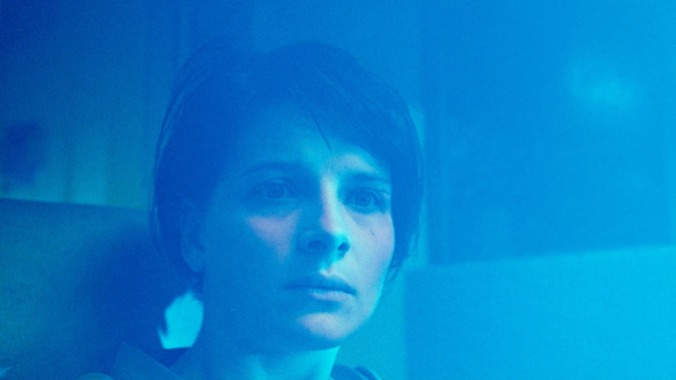Triple Threat: The Three Colors Trilogy
Krzysztof Kieslowski’s final films were an arthouse critique of Europe as it entered a new age

A story has a beginning, a middle, and an end. Maybe that’s why the trilogy is such a satisfying structure for so many epic series or curious corners of cinema history. This year in Triple Threat, Ken Lowe revisits another of cinema’s best trilogies each month, including some unofficial trilogies that have come to define a director, actor, or time in film history. You can follow the series here.
“Liberty, equality, fraternity” is France’s motto, the country’s rallying cry during its revolution and its statement of principle as a modern democracy. Krzysztof Kieślowski’s Three Colors trilogy treats each of these concepts with some measure of irony, detachment and criticism. The films—Blue, White and Red—unfold in different places, deal with different characters and tackle different subject matter even if, tonally, they all feel strangely similar. There’s connective tissue between the movies, but very little of it, and the look-how-it’s-all-connected reveal at the end of the final film, Red, feels poorly set up.
But, there’s also a scene in all three movies involving an elderly person (not the same one) so stooped that they can’t get a bottle into a recycling receptacle. In fairness to all three of these elderly Europeans, it is always an absurd scene: If a grown person, even a stooped old person, can’t get one green bottle into a recycling container, how poorly designed is the damn container? Surely a child or a disabled person couldn’t manage the feat, either. In all but one case, nobody even helps the poor old person. Set in and around the time when the European Union was about to be officially formed—it’s an explicit plot point in one film—it’s an inescapable indictment of European society as it’s being led by Western European powers like France (Kieślowski, who died in 1996, was Polish).
Now, 1993 was a long time ago. The war now happening in Europe seems bizarre and unthinkable, but in 1993 it must have felt inevitable, and the prospect of a European Union an impossible dream when the living memory of so many more people included two world wars that heralded the end of a different age. The 1990s were a time of tacky hubris in the Western world: full of articles and books about liberal democracy heralding the end of history as we knew it. The Nazis and Commies were defeated, Europe (which is always at war, historically speaking) was politically unified and the collapse of the Soviet Union meant no meaningful challenges to liberal democracy. It was pretty tone deaf, considering the conflicts and galling injustices going on in every other corner of the globe at the same time.
That dissonance isn’t the point of Kieślowski’s trilogy, in which his trio of protagonists are all struggling emotionally with heavy things like grief, rejection and loneliness, but watching it nowadays, it is the inescapable subtext.
The Movies
Blue begins with shots of a family traveling by car, and the brake line dripping fluid that they don’t know about. The crash claims the lives of Julie’s (Juliette Binoche) husband and daughter. As we watch her wretched convalescence in a hospital, we learn that her husband was a world-famous composer whose anticipated symphony celebrating the impending creation of the European Union is now seemingly destined to be unfinished. (The film came out two months before the treaty forming the E.U. took effect.)
We also learn, from a journalist who won’t give her any space, that Julie may be responsible for her husband’s compositions. The film follows her as she desperately tries to distance herself from her past, choosing to protect herself from the unbearable pain of her grief by divesting herself of all connection and possession. It’s ultimately a search for freedom—freedom from the obligation to a husband she learns has cheated on her, freedom from the public eye during her time of woe, freedom even from having to keep a home or take responsibility for causing more tragedy. At one point, unable to contemplate kicking a family of rats from her apartment, she enlists a neighbor’s cat and then just deploys it like a weapon, leaving the clean-up to a sex worker who lives downstairs whom she’s unintentionally befriended (Charlotte Véry).
Julie eventually achieves closure with her dead husband’s legacy and even seems to commit to accepting the spotlight. Whether she will achieve it, and whether it truly means “liberty” for her, is an open question.
White follows the story of Karol Karol (Zbigniew Zamachowski), a Polish immigrant whose Parisian wife (Julie Delpy) divorces him for being unable to consummate their marriage. Finding him sleeping in her studio, she lights the place on fire to pin the crime on him, and he finds himself penniless in the metro. There, he’s helped by another Pole abroad, Mikolaj (Janusz Gajos), who makes an odd offer: If he’ll kill a guy who has requested he be killed, he’ll pay Karol a tidy sum. Karol agrees and, seeing that his now ex-wife has already moved on to another man, decides to go with Mikolaj back to Poland.
-

-

-

-

-

-

-

-

-

-

-

-

-

-

-

-

-

-

-

-

-

-

-

-

-

-

-

-

-

-

-

-

-

-

-

-

-

-

-

-








































